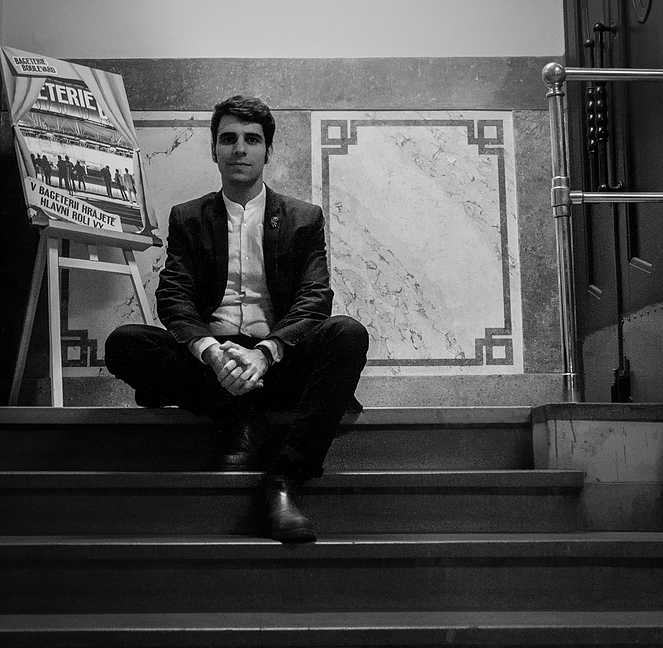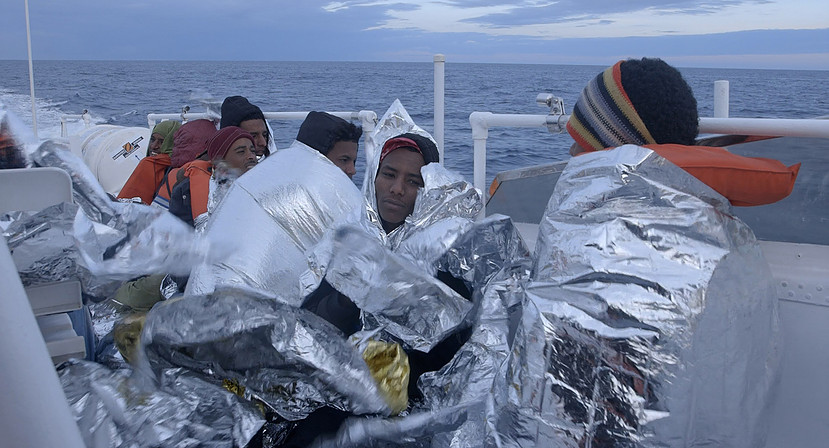An interview with director Jakob Brossmann on filming life at the border island of Lampedusa
Photo Interview by Zak Varvaresso

Your film just debuted at Locarno film fest and has been this year’s Europa Cinemas official film selection.
JAKOB BROSSMANN: It was a great honour for me, because I really care a lot about two things: the first one is cinema and the other is Europe and this was connected in this event
How you got involved with documentary filmmaking?
JAKOB BROSSMANN: In the beginning I was not aware about the possibilities offered by the documentary format. I was interested in the tradition of working class film, I am huge fan of Italian neorealism. Then I found Michael Glawogger, the Austrian film maker – who passed away last year – he made intense films about hard working people. But he believed that modern society gradually loses it’s connection with the physical work. So I started realising that documentary was a possibility for me to get in a direct way to the topics that interested me the most: Questions of daily life and work, the fact that very different lives are happening at the same time very close to each other in a multilayered reality.
And how did you end up specifically in Lampedusa?
JAKOB BROSSMANN: As I started asking those questions I came across an other topic very important for me: the question of immigration and refugee in Europe, a multilayered world that has a lot of contradictions and how we deal with arriving humans asking for our protection. Years ago I was working on a film screen play about Jewish refugees who were pushed back from Switzerland during the WWII. Then the Arab spring started and I saw pictures from Lampedusa of refugees arriving by boats – but something was always missing: I never saw pictures of local people giving shelter, saying hello, helping them out. The discussion revolved around the question of how many people should be allowed to enter EU and so I realised that after all that years the question of people getting pushed back was so similar. That was a concrete moment for me where I said that I want to do a film about Lampedusa. But in this island besides refugees there was a daily life with fishermen working hard and people with an everyday reality…
You stayed there for three years. How you managed to capture all those aspects?
JAKOB BROSSMANN: We were getting with the team to Lampedusa every winter and try to stay there for two or three months each season. We built a relationship with people on the island. But it was not an easy time. I didn’t want to film interviews as I come from this tradition of observational cinema where the narration comes from real everyday moments of people. We never knew if we would be able to bring the whole concept of the island into the film. This is a film about several things happening at the same time: people who try to rescue refugees, people criticising the events at European borders, the daily life and the problems of the community and the daily life of the refugees…There were a lot of different aspects and the one without the other would be pointless.
What message do you think finally came out of all these?
JAKOB BROSSMANN: The first message of Lampedusa is that life goes on. Secondly: There is no place for racism or hatred there. Of course there are people who stand against the refugees but they don’t have a common ground- they have to talk behind closed doors and this is a huge success for a community of this type. Third: The interesting thing is that the state would be completely lost without all those people who do voluntary work by helping and translating and by giving food and clothes and dignity to the refugees.
In your film we witness conscientious Italian Coast Guards doing their duty bravely. However in Italy there have been reported several cases of violent push backs, while this period in the Mediterranean sea Greek Coast Guard has notoriously been accused of deliberately drowning migrants off the coast of greek islands.
JAKOB BROSSMANN: There have been situations in Italy and authorities have convicted by the european court for doing illegal push backs in the sea. But in Lampedusa the coast guards – as you see in the film – have saved thousands of lives during the last years under extreme circumstances and they considered to be heroes. I don’t know exactly the situation in Greece… but the island of Lampedusa is in the open sea and there is no land anywhere near so the coast guards -even the rightwing ones- know that push backs mean death. So there are not so many reported incidents. On the other hand there are a lot of NGOs and private people that are monitoring the situation and in a way are controlling everyday the Italian forces which is very important. I believe, the the guilt in this question in Italy is mostly on an institutional level, and not on a personal…
However it seems that apart from the management in humanitarian context, EU as political formation in substance strengthens its policy towards refugees.
JAKOB BROSSMANN: The European Union in this moment is in very difficult situation as there is a lack of democracy within. It seems to me that is not being ruled by the european parliament but by more or less powerful governments like Germany which represents the interests of a small minority of european people. It brings me to the point that,as it is now, there is no real way for solidarity in all different layers between european countries. If you look at the economic development in the European Union there is huge inequality between european states. If there is no fairness and solidarity in those layers you cant ask for solidarity in helping refugees.
But besides that it is a moral duty to help every single refugee and give him/her the chance of a self-decided life. In my opinion the so called refugee crisis is a call for Europe to show the strength of solidarity in all parts of european co existence-living and working together. The question is, can this be done in a situation where European countries are competing against each other in several product markets, for the possibility to sell their products cheaper? As long as this is the main paradigm I don’t think so…
And immigrants have always been the cheapest labor as long as they come in line. As the situation on the Eastern Front has escalated, even northern countries like Poland and Hungary are closing their borders in order to prevent the migrant flow.
JAKOB BROSSMANN: The Austrian minister of the Interior said that we have to make Austria “unattractive” for refugees. This policy is based on Geopolitical Economics and those politics are always politics of competition. They compete not only on the level of well treating the rich, to get them in, but also to misstreat the poor, to keep them out. They believe that the better they treat one refugee, the faster the second one will arrive. But this will only be the case if we won’t implement structures of solidarity – if other countries keep pushing standards down.
Aren’t you a bit romantic to believe in solidarity within EU? How can you achieve it?
JAKOB BROSSMANN: According to left-wing tradition we know what we want, but we don’t know how to do it. We have to find out by doing it. But we know how to live with unanswered questions and go and ask at the same time. People lost hope after the Arab spring and thought that change and revolution is pointless – but after their encounter with the refugees they realised they can do something, and by doing it they raised their voice and set a sign.
I believe that becoming active gives people a new sense of life and maybe there is the answer. It is important to feel, that we can do something, that we can do “it”. In Lampedusa we see that we can do it. The Dignity we give, enriches all of us and I hope when people see the film, they will be encouraged to do it.
Story published online in greek by EFSYN paper, November, 2015
